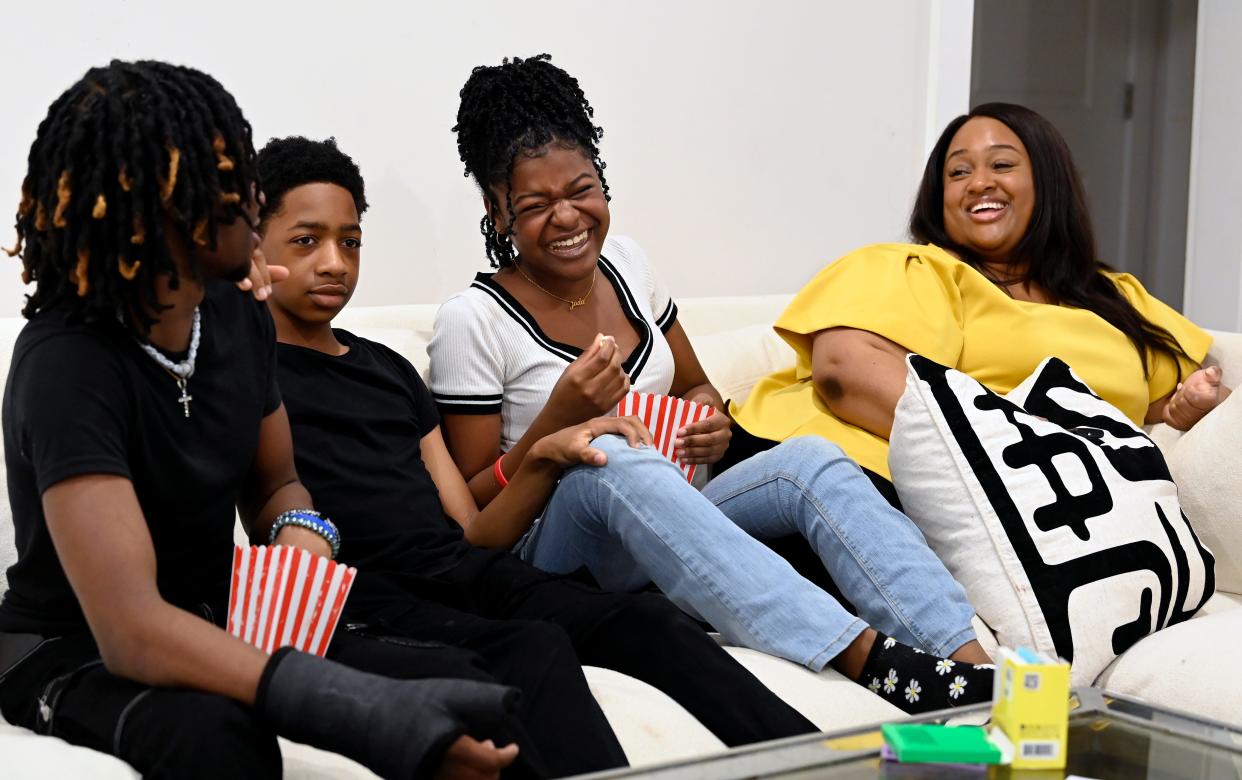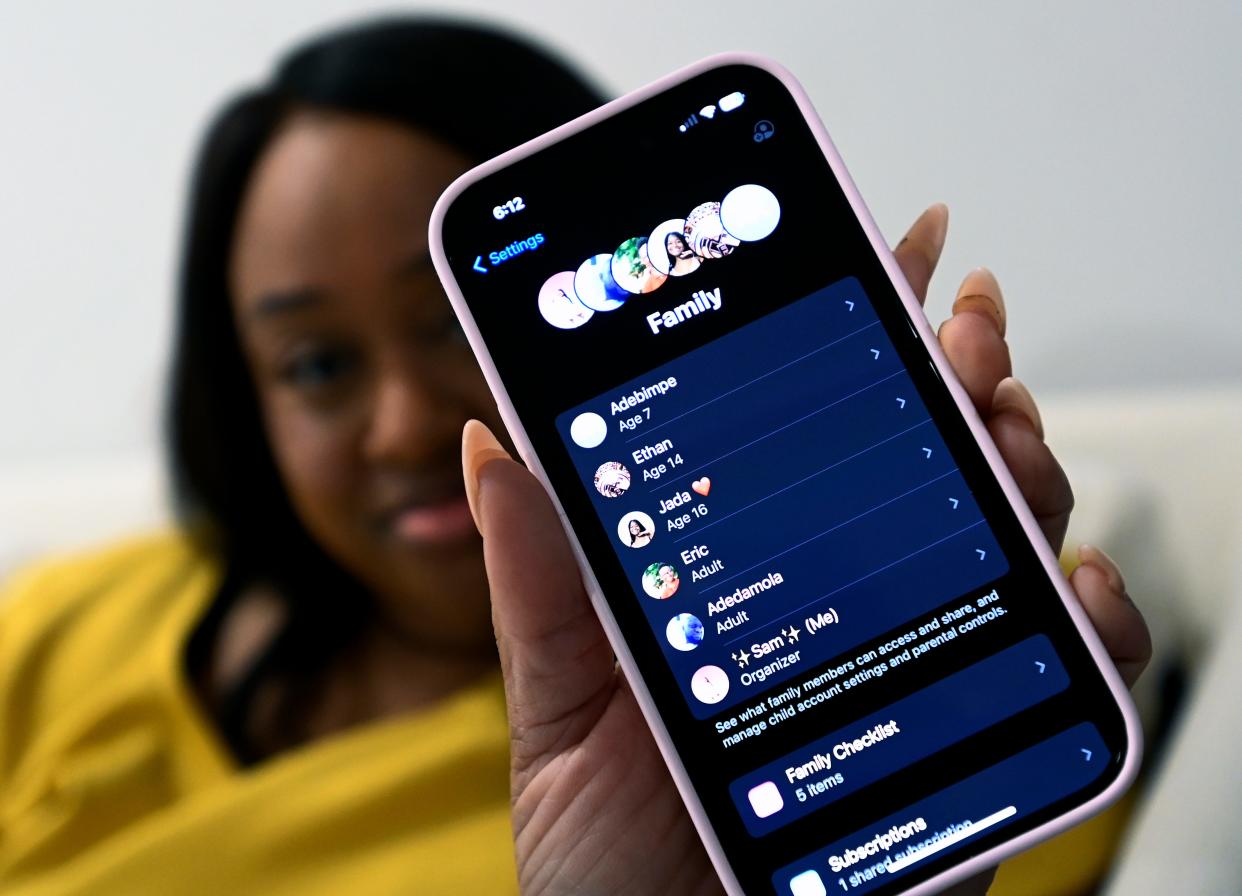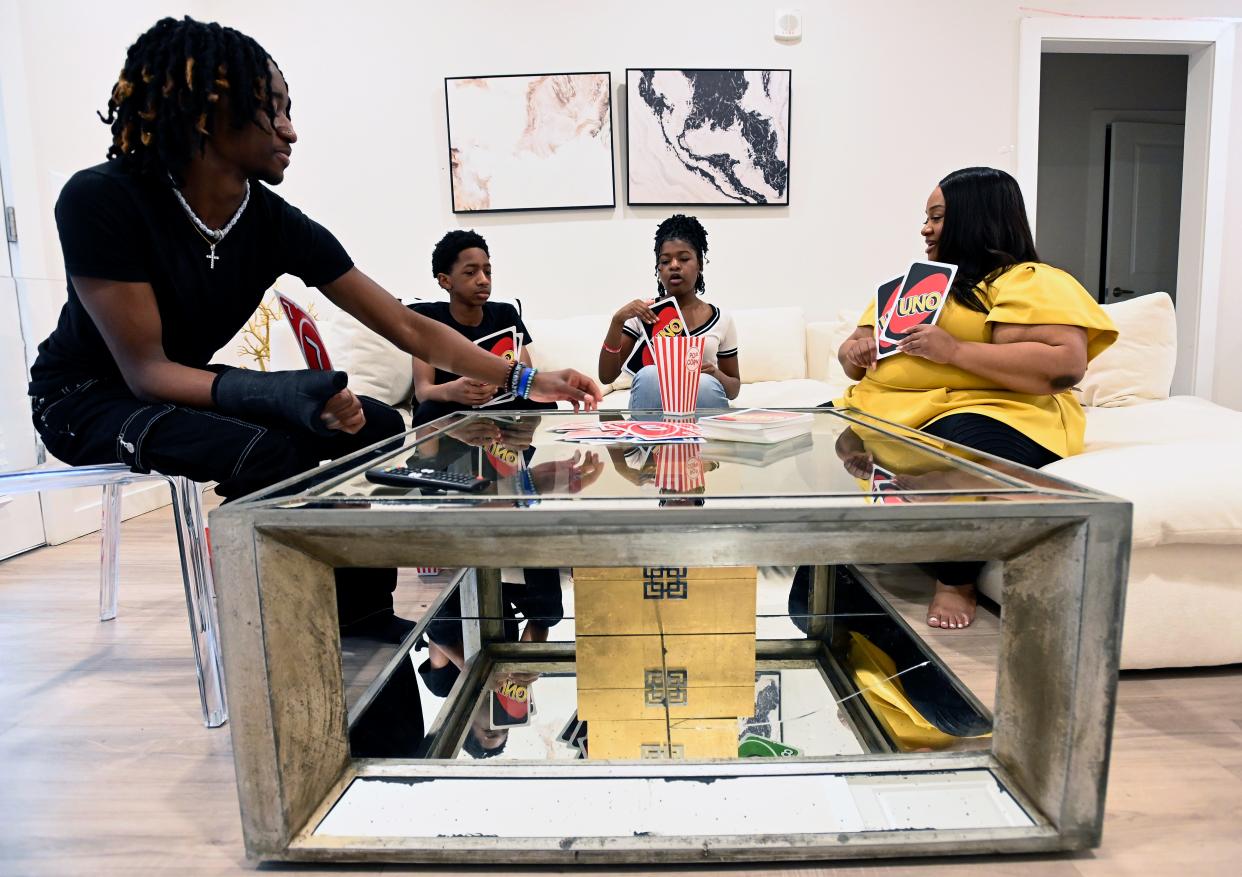Can kids safely navigate social media? Experts, litigation want to make it possible
Social media, with all its potential harms, can also be something that fosters healthy dialogue, fun and safe boundaries for kids.
Samantha Sharpe, a 36-year-old mother, keeps that in mind both as a digital creator and as a parent of three teenagers.
Going by Samantha Danielle online, she's built up around 15,000 Instagram followers through sharing her lifestyle and perspective as a mother. While she shares honestly and openly about her journey, she's also an advocate for setting healthy boundaries for herself — and her children — when it comes to social media.
She makes sure her kids, who are 14, 16 and 18, know they are in control of what's shared about them. She also assures them they don’t have to do anything for the sake of posting on social media, both on her account and their own pages.
"I have asked my kids straight up: Are you OK with me sharing this? Do you want to be a part of this?" Sharpe said. "I don’t overshare them … They’re not on-air talent."

As her kids grew older, Sharpe dove into research on how best to introduce them to social media and what guidelines to put in place. For her, it starts with a serious conversation about how they use technology before she puts an iPhone or other digital device in their hands. She makes sure they understand the risks, establishes firm rules and sets up parental controls.
While social media can be a positive part of family life, Sharpe said she's ever-aware of the pitfalls it can have, especially on apps that make it difficult for parents to monitor what's happening or that are designed to get kids hooked.
In recent years, hundreds of parties, including parents, youth, school districts and even states, have joined lawsuits and cases against social media companies to hold them accountable and create meaningful safeguards. Top medical experts and lawmakers have also added their voices to the conversation about keeping kids safe online.
Here's a look at what that push for change looks like.
Legal action mounting: Can parents, school districts suing social media companies make platforms safer?
A warning and a call to action
U.S. Surgeon General Dr. Vivek Hallegere Murthy recently called for "immediate action" by tech companies and lawmakers to protect children on social media.
The advisory, issued last spring, included a dire warning about the harms of social media for kids. For example, children who spend more than three hours a day on social media are twice as likely to face mental health problems including depression and anxiety. That concern only compounds in light of a recent survey that revealed U.S. teens report an average 3.5 hours of daily social media use, according to the advisory.
"At a moment when we are experiencing a national youth mental health crisis, now is the time to act swiftly and decisively to protect children and adolescents from risk of harm," the advisory stated.
A call to action: US surgeon general wants to protect kids' mental health on social media
The surgeon general is far from the only one talking about action.
In a rare moment of bipartisanship in January, members of the U.S. Senate pressed CEOs from TikTok, Snap, X and Meta about dangers of their platforms for children. They asked about issues like enabling sexual predators, the glorification of suicide and eating disorders, bullying and the platforms' addictive features.
Legal action is also mounting against social media companies.
A growing body of research reflects much of what a sprawling case against Meta, Instagram, Snap, TikTok, YouTube and others argues. Plaintiffs cite harmful factors like endless content, a lack of limits on screen time, algorithms designed to keep kids online, constant notifications and filters that can change the way people look and cause negative body image messages. They also point to heightened risks of interactions with child predators, driven by nonexistent or lax age verification rules, private chats and geolocation features.
The case goes so far as to say social media platforms have "rewired how our kids think, feel and behave." It argues things such as "likes" on posts and mindless scrolling have displaced real, close friendships and creativity, play and sport. That leads to disconnection, disassociation and harm.
Read more: TikTok, Snap, X and Meta CEOs grilled at tense Senate hearing on social media and kids
How to create safe, fun space for kids with social media
Dr. Katherine Spencer, a pediatric psychologist at the Monroe Carell Jr. Children's Hospital at Vanderbilt in Nashville, is also the mother of a young teen. Like Sharpe, she believes that social media can be a wonderful, fun space for families to share with the right rules in place.
For now, she's holding off on letting her child use social media, but for those considering introducing their kids to it, she recommends examining the following questions:
What is your child's intellectual ability? Consider if they're mentally ready to navigate social media.
What is your child's judgment like? Are they consistently making good choices?
Is your child already able to balance their time with other digital media, like TV and the internet, with their school work and other activities?
Have you set family guidelines on what's safe and unsafe when it comes to digital or social media, along with what's good and bad for them to consume?
She also recommends setting parental controls that limit how long and how often children can access social media. She said it's important to have passwords to all their accounts and the ability to see all the content children post, like and view.

Sharpe, the digital creator, said she uses parental controls for her younger kids, which gives her full access to their accounts. As they get older, she has a conversation about giving them more leeway. She said it's important to keep conversations open and honest with her kids so she can spot the first signs of trouble before it escalates.
She also joked that her kids apply the same rules to her, often calling out her own unhealthy habits.
The conversation around social media doesn't always have to be about boundaries or rules, too, Sharpe said. It can be a way to bond as a family. Her 16-year-old daughter, for example, loves to make TikToks and often asks her mom to join.
“She's a social media girl. … She loves to talk about it," Sharpe said with a smile. "She loves to even critique me and be like, ‘That's not cute, mom.'"
Sharpe is also big about family time that has nothing to do with social media, like playing games, watching movies or getting outside. She emphasizes to her kids that it's important to give their brains a break from their phones and social media.

Vanderbilt psychologist witnesses harms of social media
In her work at the children's hospital at Vanderbilt, Spencer has seen the harmful effects of social media firsthand. She said the fallout can be especially harsh for children who are still developing.
As an example, Spencer said she's seen children with what's called a "TikTok tic." Tics are often associated with Tourette's Syndrome, which can cause people to make sudden twitches, movements or sounds repeatedly. According to a 2022 article from Harvard Health Publishing, neurologists saw an unusual increase in children exhibiting tics, especially among teenage girls, in recent years.
"After ruling out other explanations, the tics in these teenagers seemed related to many hours spent watching TikTok videos of people who report having Tourette syndrome and other movement disorders," the article said.
Spencer has also seen children use social media to measure their self-worth or to seek information and connections that reinforce negative, destructive habits or ways of thinking. Negative messages about body image or conversations about self-harm on social media have also impacted her patients. Additionally, she's seen social media use disrupt sleep and aggravate anxiety and depression.
Navigating social media: How do I keep my kids safe online?
Even with her observations and research, Spencer said she and other experts are still catching up on the full effects of social media.
"We just don't know the long-term effects," she said.
When it comes to directly linking the ongoing youth mental health crisis with social media, Spencer was cautious.
"I don't think that we can prove any specific causation," she said. "But it's certainly a part of it."
Amid the growing pressure to rein in social media companies and make their platforms safer, Sharpe, the digital creator, sees it as a two-way street. While she supports holding social media companies accountable and adding more safeguards, she also said it's important that parents educate themselves and develop clear, healthy rules for their children.
She echoed Spencer's thoughts on how the rapidly evolving landscape of social media complicates the matter.
"I always say it's a first-generation problem," Sharpe said. "We're all learning and navigating together."
More resources
Read the full U.S. Surgeon General's advisory on social media at hhs.gov/SurgeonGeneral/priorities/youth-mental-health/social-media. The page also includes in-depth resources, steps to take action and access to expert advice.
Evan Mealins contributed to this story.
Reach children's reporter Rachel Wegner at RAwegner@tennessean.com or find her on social media @RachelAnnWegner on Twitter, Threads and Bluesky.
This article originally appeared on Nashville Tennessean: Protecting kids on social media: Experts, lawsuits push for change
